Each historical period, including ours, is characterized by some relevant events that contribute to changing the state of the world. The recent pandemic, the continuous and incredible technological progress, the threat of climate change. Society goes through these collective experiences and evolves at an incredible speed, as does the job market. New needs and new solutions emerge, creating new professions and extinguishing others. Green jobs are certainly a branch that is growing at remarkable speed, fuelled by the increasing pressure of the climate crisis.
Green jobs are defined by the International Labour Organization as “[…] jobs that contribute to preserve or restore the environment, be they in traditional sectors such as manufacturing and construction, or in new, emerging green sectors such as renewable energy and energy efficiency”. The expectation is that the transition to a green economy will create a net increase of 18 million jobs by 2030. The growth will be driven primarily by the construction and renewable energy sectors, while most of the losses will be related to the mining and refining of the fossil fuel industry.
The European Commission presented last year a publication examining the future skills and professions that will be in demand in the labor market. The analysis presents a scenario for the year 2040 and classifies the different professions in existing jobs, emerging jobs and future jobs. Existing jobs include green jobs that have already begun to spread and will continue to grow in the next few decades. Instead, emerging jobs and future jobs are those professions that are still rare or non-existent, respectively, and will become more common in the future.
Let’s take a look at what the professions of the future might be.

Existing jobs
Sustainable finance specialist: social pressure and the risks associated with climate change will force financial institutions to increasingly integrate sustainability into their businesses. The main tasks of a sustainable financial specialist may include assessing the risks of an investment from a sustainability perspective, producing sustainability reports and organizing training for companies on sustainability issues.
Inclusive urban landscape architect: this profession aims to create a balance between city and nature, while mitigating the climate and protecting human and animal health. This requires the creation of new solutions and the use innovative materials.
Emerging jobs
Material passport producer: it consists in analysing and attributing an environmental footprint to products and buildings. The goal of this profession is to facilitate the recovery and recycling of the material.
Environmental data analyst: in order to monitor the environmental situation in critical areas, environmental data analysts will have the task of collecting the necessary data. Part of their work will consist of data quality checks and consistency analysis, while the part of big data analysis will be performed by AI.
Urban micro farmer: farming will become more common in cities in order to ensure food supply and reduce transport. With the support of digital monitoring systems, urban farmers will cultivate on rooftops and small portion of lands within the cities.
Future jobs
Green opportunity spotter: with the green transition there is also the need to navigate the new green jobs market. Green opportunity spotters can provide guidance to people who are looking to use their skills for a career related to the environmental field.
Appliance sharing hub connector: this profession is an example of how environmental entrepreneurship can produce both environmental and economic benefits for society. In this case, an app allows people to repair their items by producing spare parts via 3d printers or to sell their old objects to other users. In the future, we can expect similar solutions that support the circular economy to become more common, and environmental entrepreneurship to become more thriving.
Businesses will be more resilient with green jobs
Green jobs are not just a natural consequence of the green transition, they are a necessity for a thriving economy. In fact, environmental degradation increases the risks for businesses. For example, the increase in extreme weather events implies high uncertainty which will increase the cost of operations; or the reduced availability of water will force to modify some production processes and to limit growth, especially in some sectors such as the textile one. For these and many other reasons, firms that are investing in green jobs and a more sustainable business will have to bear short-term costs, but they will be paid off in long-term benefits.
The International Labour Organization reported data collected by CDP in 2015 on 1.839 enterprises that were implementing greenhouse gas reduction initiatives. For more than 60 per cent of firms, the investment paid off in less than three years, and for 80 per cent in less than ten years, thanks to an increased savings and growth in sales.
Cover photo by Marten Bjork on Unsplash.



